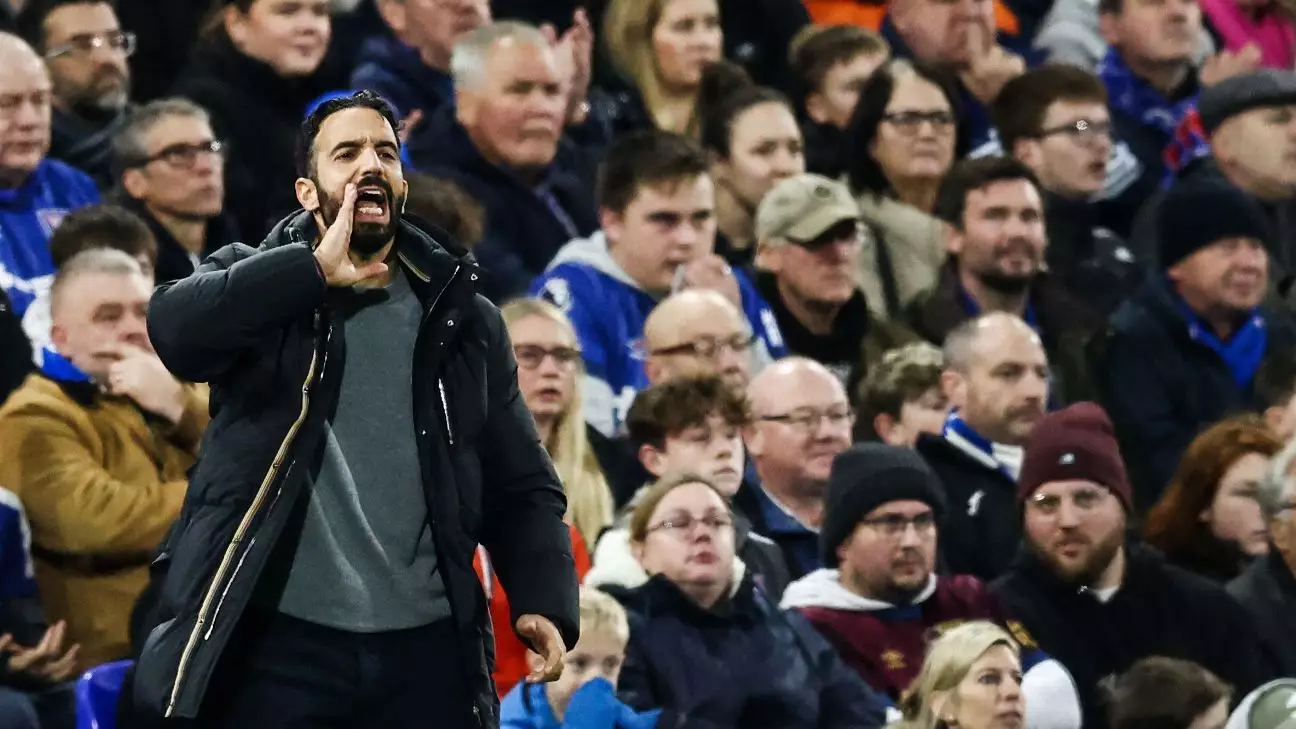In the heart of Ipswich, Ruben Amorim stepped into the spotlight as Manchester United’s new manager, only to find that the path ahead was fraught with obstacles. The initial euphoria came quickly; Marcus Rashford, the embodiment of United’s recent struggles, opened the scoring just two minutes into the match against Ipswich Town. Yet, within a matter of moments, the façade of a straightforward victory shattered, exposing the deep-seated issues that have plagued the club.
The game ended in a frustrating 1-1 draw, leaving Amorim with much more than just a point to ponder. Underneath the bright start lay a reality check for the 39-year-old, who has the monumental task of restoring the former glory of a once-great club.
Personnel Decisions and Tactical Struggles
Amorim’s management style came to the forefront when he confronted Joshua Zirkzee, a late-game substitute who seemed to drift through the match instead of aggressively pursuing scoring opportunities. This moment underscored the systemic issues at United – a lack of urgency and a worrying detachment among the players. When a coach must instruct a forward to take charge in critical moments, it suggests that a culture of motivation and self-responsibility is alarmingly absent.
Amorim’s ambitions to rejuvenate Manchester United echo his successful tenure at Sporting CP, where he introduced a robust competitive mentality and secured multiple league titles. However, the transition from Portugal to one of the world’s most scrutinized football organizations presents a unique set of challenges. At Ipswich, Amorim’s frustration was palpable as he urged his players to forge ahead, countering a habit of retreating to safety – a habit that has rooted itself during previous managerial reigns, notably Erik ten Hag’s.
The Weight of Expectations
Despite an opening goal that hinted at potential resurgence, the equalizer by Omari Hutchinson minutes before halftime served as a grim reminder of the uphill battle ahead for Amorim. The defensive lapses and missed opportunities from players like Liam Delap, thwarted by the efforts of goalkeeper André Onana, illustrated the lack of coherence within the team. This match not only showcased the immediate inadequacies but also the broader narrative of underachievement that has enveloped Old Trafford in recent seasons.
As patrons held up a supportive banner proclaiming “Good Luck Ruben Amorim – Make Our Team Great Again,” the expectation for his management loomed large. Amorim’s commitment to a 3-4-2-1 formation, a testament to his philosophy from Sporting, faced immediate scrutiny given the unexpected injuries that forced him to field a makeshift defense. This tactical rigidity against backdrops of player unavailability hampered the team’s dynamism, revealing just how far the squad is from being capable of executing Amorim’s vision.
While Amorim’s inexperience in the Premier League became apparent, particularly in his inability to ignite a powerful response from the bench, it is vital to understand the inherent complications in turning around a side steeped in mediocrity. His acknowledgment that the players were “overthinking” during the game indicates an awareness of the mental disarray that can come from transitioning between systems and managerial philosophies.
In the long race ahead, Amorim must prioritize building a team that trusts in its capabilities and plays with freedom rather than fear. The path to revitalizing United will undoubtedly be riddled with frustration, but by instilling a sense of purpose, challenging the players physically, and promoting tactical understanding, he may ignite a revival.
Moreover, the insistence on conditioning and physical robustness suggests a need for significant team evolution. Amorim’s readiness to accept the existing faults while aiming to construct a more fluid and energetic squad is essential for the long-term health of the club.
The disjointed performance in Ipswich may have denied Amorim a dream start but ultimately serves as an early indication of the arduous journey ahead. It is through these challenges that the potential for a renewed Manchester United may emerge. Adapting to the demands of the Premier League with a squad that needs retraining is no small feat. Amorim’s philosophy must translate not only into tactical formations but deeply into the psyche of the players, enabling them to reclaim their competitive edge.
The task at hand is monumental, but with time, determination, and the right approach, Amorim could pave a pathway from the ashes of disappointment towards the resurgence of Manchester United as a force to be reckoned with once more. The allure of turning the ship around at Old Trafford may be daunting, but Amorim has the potential to script his own legacy amid the echoes of the past.

